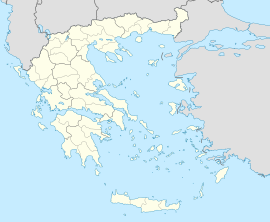Kaloi Limenes
Kaloi Limenes
Καλοί Λιμένες | |
|---|---|
Settlement | |
 Panorama of Kaloi Limenes, painted by Thomas Abel Brimage Spratt, from Travels and researches in Crete (1865) | |
| Coordinates: 34°55′46.9″N 24°48′01.1″E / 34.929694°N 24.800306°E | |
| Country | Greece |
| Administrative region | Crete |
| Regional unit | Heraklion |
| Municipality | Faistos |
| Municipal unit | Moires |
| Community | Pigaidakia |
| Population (2021)[1] | |
• Total | 17 |
| Time zone | UTC+2 (EET) |
| • Summer (DST) | UTC+3 (EEST) |
| Postal code | 700 09 |
| Area code(s) | 28920 |
Kaloi Limenes or Kali Limenes (Greek: Καλοί Λιμένες [kaliˈ liménes]) is a village and port in the Heraklion regional unit, southern Crete, in Greece, located 70km (43.5 miles) south-west of the city of Heraklion. It has 17 inhabitants (2021).[1] It is known as a major bunkering spot for ships in the southern Mediterranean.[2]
History
[edit]Kaloi Limenes (meaning 'good harbors' or 'fair havens') is a natural port near the southernmost point of Crete. It is close to the village of Lentas (ancient Levin), and the unexcavated remains of Lassea, a port for the ancient settlement of Gortys.[3]
According to the Acts of the Apostles, Apostle Paul, landed at Kaloi Limenes on his way from Caesarea to Rome as a prisoner of the Romans,[4][5] then attempted to proceed further west along the coast to Phoinikas ("Phoenix"), identified to the homonym small village in the bay west of Loutro or Loutro itself.[6][7][8][9] A small church was built there (first in Byzantine times, then restored in the 1960s).[6]
Bunkering
[edit]The port is the home of a major oil storage and terminal facility, located on the small island of Aghios Pavlos ("Saint Paul") at the port's entrance. The facility has four shore-based storage tanks containing fuel oil and gasoil, pumps of 1,000 cubic metres per hour capacity and three loading docks.[10] The terminal's maximum draft of 40 feet (13.45 metres)[10] enables the facility to handle oil tankers of up to approximately two hundred thousand metric tons of deadweight.[2]
See also
[edit]Notes
[edit]- ^ a b "Αποτελέσματα Απογραφής Πληθυσμού - Κατοικιών 2021, Μόνιμος Πληθυσμός κατά οικισμό" [Results of the 2021 Population - Housing Census, Permanent population by settlement] (in Greek). Hellenic Statistical Authority. 29 March 2024.
- ^ a b Kali Limenes information Archived 2008-09-13 at the Wayback Machine from InfoMarine
- ^ Prefecture of Heraklio: Kali Limenes from the Hellenic Resources Network
- ^ "Bible Study.org". Archived from the original on 2010-01-26. Retrieved 2010-05-12.
- ^ White, Jefferson Evidence and Paul's Journeys, Chapter: "Caesarea to Fair Havens" Archived 2014-07-19 at the Wayback Machine, Parsagard Press, 2001, ISBN 978-0-9705695-0-9
- ^ a b Captain T.A.B. Spratt, Travels and Researches in Crete, 1865, II 1-6
- ^ "Bible Maps". Archived from the original on 2010-09-17. Retrieved 2010-05-12.
- ^ Llewellyn-Smith, Michael The Great Island, Longmans, 1965; online edition Sunshade Press, 2007. The ISBN printed in the document (978-0-95282-4-2) is invalid.
- ^ Fielding, Xan The Stronghold: An Account of the Four Seasons in the White Mountains of Crete, Secker and Warburg, 1953: "St Paul landed at the village of Phoenix after barely escaping shipwreck on one of his many propaganda tours. And when he did land he barely escaped with his life, for he was looked on as a busybody and promptly beaten up. The preaching of the apostle could hardly have endeared him to such happy-go-lucky pagans. That, at least, is what they say in Loutro today: and I can well believe it."
- ^ a b "O.W. Bunker & Seka to cooperate at Crete bunker station" Marine World, 22 January 2004
External links
[edit]- Kali_Limenes, World Port source

